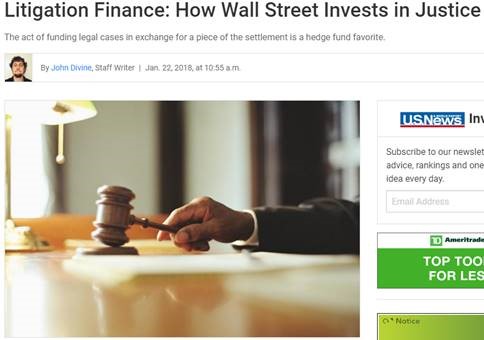U.S. News & World Report explored litigation finance, the funding of legal cases in exchange for a piece of the settlement. Wilk Auslander’s Jay Auslander explains the ins and outs of litigation finance and why they are popular with hedge funds.
![]()
January 22, 2018
Unique Visitors Per Month: 15,191,000

Litigation Finance: How Wall Street Invests in Justice
The act of funding legal cases in exchange for a piece of the settlement is a hedge fund favorite.
On Wall Street, money never sleeps. Money managers controlling trillions of dollars in assets devote their professional lives to finding the best opportunities to earn a return for the lowest amount of risk.
In this environment, an obscure field called litigation finance is thriving.
Necessity, as they say, is the mother of invention, and for investors there is no greater necessity than finding ways to make as much money as possible with correspondingly little risk. And if an attractive asset class happens to be uncorrelated with the rest of the markets, all the better.
What is litigation finance? Third-party funding for legal cases – in which an external party foots one party's legal fees in exchange for a cut of the settlement – began to catch on in Australia, the U.K. and the U.S. in the 1990s. Antiquated common law prohibitions against "champerty and maintenance," which stood in the way, were weakened by high courts, allowing the practice to grow.
Both individuals and corporations can obtain this kind of financing. Consumers often don't merely use it to pay legal fees; pre-settlement funding can be used to finance costs of living and other expenses. Wall Street tends to focus on commercial (i.e. corporate) cases.
Since the 1990s, investment outfits dedicated to funding lawsuits began to spring up, and now this burgeoning "asset class" is a multibillion-dollar industry. Technically, they're considered non-recourse cash advances, so they're investments, not loans.
The practice grew quietly but made headlines in 2016 when billionaire Peter Thiel, co-founder of PayPal Holdings (Nasdaq: PYPL) and an early large investor in Facebook (FB), successfully financed Hulk Hogan's lawsuit against Gawker, a news website, ultimately causing its bankruptcy.
Why hedge funds love litigation finance. Hedge funds have emerged as some of the biggest investors in litigation financing deals, and when you look at exactly how many of these deals are typically structured, it's easy to understand why.
"Imagine there's a spectacular victory. The litigation financer invests $100,000 and the case settles for 10 times that. The litigation financing arm gets back the first $100,000. They then get back 100 percent of that. And then they typically get a percentage of everything else," says Jay Auslander, litigation partner at Wilk Auslander, a firm with experience in these cases.
That chunk of the remainder varies from case to case – deals are individually negotiated – but often ranges from 10 to 20 percent.
That's not a bad return. In Auslander's example, assuming a 15 percent rake on the remainder ($800,000), the financier alone walks away with $320,000, a 220 percent return – a 32 percent cut of the settlement.
And if it settles for $250,000? The same structure applies. The financier collects his $100,000 investment plus another $100,000, then 15 percent of the remaining $50,000. The fund gets paid before anyone else, and in this case takes $207,500, or 83 percent, of the ultimate settlement.
What's the downside?
"If there's no win they get nothing," Auslander says. As in stocks, your loss is limited to your investment. That said, these funds protect their downside risk pretty aggressively.
"All of these funds do very extensive due diligence before the case," Auslander says. They won't take it if you don't have a good shot.
Another plus for hedge funds: Settlement funding is what Wall Street pros call an "uncorrelated asset class." Who cares if the Dow is up 1,000? Who cares if it's down 1,000? The returns on legal financing are almost entirely independent of the stock market.
"Many investors are weary of having too much invested in primary markets because of the collapse in 2009," says Jeff White, legal and financial analyst for FitSmallBusiness.com.
"They're more than willing to make this calculated risk because it diversifies their investments and provides a nice return most of the time, if you do your research first," White says.
For hedge funds, which are designed to make money in both up and down markets, this is the perfect alternative investment.
Combine that with an industry that's lightly regulated and it's little wonder the practice has exploded.
A different, darker structure of litigation financing. The structure outlined above, though wildly expensive for the plaintiff, makes some sense. After all, 68 percent of a pie – and even 17 percent of a pie – is worth more than 100 percent of zilch. If the plaintiff couldn't afford to get the case to the finish line, they ultimately came out in the black, and with no upfront costs.
But on the consumer side, there are other, far more unsavory situations in which plaintiffs may already have a settlement locked down but left undistributed. Instead of providing money to the plaintiff for legal fees, firms will give advances against the eventual settlement for day-to-day living expenses.
These cases contrast starkly with commercial litigation finance, as there is nothing (or far less) ventured. The settlement, remember, is already a done deal.
Unsurprisingly, these advances are given with insane interest rates attached to them. Rates that would often be considered usurious if they were classified as loans. The risk is not commensurate to the reward.
When litigation funding is done this way it can be overtly predatory, and the kinds of people who seek it out are generally poor, uneducated and often – due to the nature of legal settlements – injured, unhealthy or out of work.
The Consumer Financial Protection Bureau has shown serious interest in protecting these victims from being victimized once again, and has taken one of the biggest firms in the industry, RD Legal, to court for using these practices to milk money from both 9/11 first responders and retired NFL players awaiting payouts from settlement funds.
RD Legal and others in the industry like J.G. Wentworth are challenging the CFPB's authority to regulate their businesses, though, and it's not yet clear whether the bureau, established by the Dodd-Frank Act of 2010, will be affirmed to have that power. The CFPB's strength has already been severely weakened under the Trump administration and Mick Mulvaney.
Pros of litigation finance. There is one compelling upside to litigation financing, in theory: It levels the playing field.
Having deep pockets doesn't necessarily mean you can drown a small plaintiff in legal fees anymore; if they have a strong case and the potential damages are large enough, legal financing can force a much fairer settlement.
Plus, if you take legal financing and end up losing your case, you don't owe the financier any money. That's the downside risk for investors on the other side of the transaction.
Cons of litigation finance. There are a number of negatives related to litigation financing.
- It further congests courts with additional cases.
- Litigation financing can create the incentive to bring frivolous or unnecessary cases, or cases that exploit loopholes.
- Far from leveling the playing field, the extremely wealthy can, on a whim, finance lawsuits against their enemies, weighing down or destroying those they dislike merely because they can. Peter Thiel has been criticized for doing this with Gawker.
- It's insanely expensive. Because it's a "cash advance," not a loan, effective interest rates can be over 100 percent.
- Consumer advances tend to take advantage disproportionately of the poor, minorities, the uneducated, and the sick and desperate.
- There is simply something perverse about putting a thumb on the scales of justice.
How to invest in or obtain litigation financing. At the moment, there are very few ways for individuals to invest in litigation finance, but the field may become more accessible to retail investors over time.
Currently LexShares is the only mainstream way for U.S. investors to invest directly in lawsuits, and it's only available to accredited investors. The bar for being an accredited investor is high; essentially, you've got to be wealthy.
As crowdfunding becomes more popular and the industry keeps growing, however, more options could pop up.
For plaintiffs, both consumer and commercial legal funding is increasingly easy to find. Legalist, a litigation finance company founded by Eva Shang – a 2016 recipient of a $100,000 fellowship from a foundation Peter Thiel started – says, after applying for money, "you could be approved the next day and never have to worry about legal bills again."
Conclusion. Sometimes Wall Street's favorite tools are best left on Wall Street. It's lucky that credit default swaps never became available to average Americans.
Litigation financing is an incredibly innovative and interesting creation of high finance, but it's littered with ethical and philosophical quagmires. Every story has two sides, and the Robin Hood narrative that's woven by industry insiders isn't the full story.
Perhaps it's best most Americans can't afford to invest in such tricky instruments. Being part owner of a glorified payday loan operation with its tentacles in the justice system doesn't exactly inspire pride.




